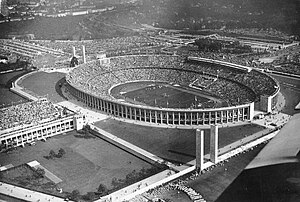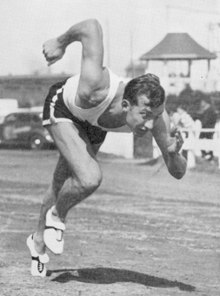1936 Summer Olympics / Athletics - 400 m hurdles (men)
|
|
|||||||||

|
|||||||||
| sport | athletics | ||||||||
| discipline | 400 meter hurdles | ||||||||
| gender | Men | ||||||||
| Attendees | 32 athletes from 19 countries | ||||||||
| Competition location | Olympiastadion Berlin | ||||||||
| Competition phase | August 3, 1936 (preliminary) August 4, 1936 (semi-finals / finals) |
||||||||
| Winning time | 52.4 s | ||||||||
|
|||||||||
|
|||||||||
The men's 400-meter hurdles at the 1936 Olympic Games in Berlin was held on August 3rd and 4th, 1936 in the Berlin Olympic Stadium. 32 athletes took part.
The American Glenn Hardin was Olympic champion ahead of the Canadian John Loaring . Bronze was won by Miguel White from the Philippines.
Existing records
- World record : 50.6 s - Glenn Hardin ( USA ), Stockholm , July 26, 1934
- Olympic record : 52.0 s - Glenn Hardin ( USA ), Los Angeles final , August 1, 1932
Conducting the competition
The runners started six heats on August 3rd. The two best athletes in each case qualified for the semi-finals on August 4th, from which the first three athletes reached the final on the same day.
Note: The qualified athletes are highlighted in light blue.
Prelims
August 3, 1936, 3 p.m.
Weather conditions: overcast, 19 to 20 ° C, wind speed at 2.7 m / s. On the back straight a diagonal headwind, on the home straight a diagonal tailwind.
Forward 1
| space | Surname | nation | time | annotation |
|---|---|---|---|---|
| 1 | József Kovács |
|
53.7 s | |
| 2 | Juul Bosmans |
|
53.8 s | |
| 3 | Prudent Joye |
|
54.1 s | |
| 4th | Tokyo Fukuda |
|
56.8 s |
Forward 2
| space | Surname | nation | time | annotation |
|---|---|---|---|---|
| 1 | Fritz Nottbrock |
|
54.7 s | |
| 2 | Dale Schofield |
|
54.8 s | |
| 3 | Luigi Facelli |
|
55.1 s | |
| 4th | James Worrall |
|
55.5 s | |
| 5 | Louis Gailliard |
|
56.4 s | |
| 6th | Avgust Banščak |
|
1: 01.5 min |
Forward 3
| space | Surname | nation | time | annotation |
|---|---|---|---|---|
| 1 | Miguel White |
|
53.4 s | |
| 2 | John Loaring |
|
54.3 s | |
| 3 | Alf Watson |
|
54.5 s | |
| 4th | Masao Ichihara |
|
54.7 s | |
| 5 | Ioannis Skiadas |
|
55.3 s | |
| 6th | Emilio Mori |
|
55.6 s |
Forward 4
| space | Surname | nation | time | annotation |
|---|---|---|---|---|
| 1 | Joseph Patterson |
|
54.4 s | |
| 2 | Juan Lavenás |
|
54.5 s | |
| 3 | Hans Scheele |
|
54.6 s | |
| 4th | Umberto Ridi |
|
55.5 s | |
| 5 | Teodoro Malasig |
|
56.1 s |
Forward 5
| space | Surname | nation | time | annotation |
|---|---|---|---|---|
| 1 | Christos mantikas |
|
53.8 s | |
| 2 | Sylvio Padilha |
|
54.2 s | |
| 3 | Vane Ivanović |
|
54.7 s | |
| 4th | Frank Rushton |
|
55.2 s | |
| 5 | Kell Areskoug |
|
55.7 s | |
| 6th | Walter Fritsch |
|
58.3 s |
Forward 6
| space | Surname | nation | time | annotation |
|---|---|---|---|---|
| 1 | Glenn Hardin |
|
53.9 s | |
| 2 | Wilhelm Jakob Kürten |
|
54.6 s | |
| 3 | Ernst Leitner |
|
54.9 s | |
| 4th | Ernst Berndt |
|
57.6 s | |
| 5 | John Sheffield |
|
58.1 s |
Semifinals
August 4, 1936, 3 p.m.
Weather conditions: overcast, 19.6 ° C, wind speed of 3.7 m / s. Headwind on the back straight.
Run 1
| space | Surname | nation | time | annotation |
|---|---|---|---|---|
| 1 | Glenn Hardin |
|
53.2 s | |
| 2 | Miguel White |
|
53.4 s | |
| 3 | Christos mantikas |
|
53.5 s | |
| 4th | Dale Schofield |
|
53.5 s | |
| 5 | Juan Lavenás |
|
54.5 s | |
| 6th | Wilhelm Jakob Kürten |
|
54.5 s |
Run 2
| space | Surname | nation | time | annotation |
|---|---|---|---|---|
| 1 | Joseph Patterson |
|
52.8 s | |
| 2 | John Loaring |
|
53.1 s | |
| 3 | Sylvio Padilha |
|
53.3 s | |
| 4th | Juul Bosmans |
|
53.4 s | |
| 5 | József Kovács |
|
54.0 s | |
| 6th | Fritz Nottbrock |
|
54.8 s |
final
| space | Surname | nation | time | annotation |
|---|---|---|---|---|
| 1 | Glenn Hardin |
|
52.4 s | |
| 2 | John Loaring |
|
52.7 s | |
| 3 | Miguel White |
|
52.8 s | |
| 4th | Joseph Patterson |
|
53.0 s | |
| 5 | Sylvio Padilha |
|
54.0 s | |
| 6th | Christos mantikas |
|
54.2 s |
August 4, 1936, 5:30 p.m.
Weather conditions: overcast, approx. 19 ° C, wind speed of 3.7 m / s, head wind on the back straight
The American Glenn Hardin crowned his career in this race. At the Olympic Games in 1932 , he had won silver and the still existing Olympic record of 52.0. s set up. At that time the rule still applied that records were only recognized if no hurdle had been broken. In 1934 Hardin had the world record in Stockholm with 50.6. s brought into his possession. And now he won the gold medal in Berlin . However, it was tighter than expected. Canadian John Loaring was only three tenths of a second behind him, and Miguel White of the Philippines was just four tenths of a second. For both of them there was silver and bronze. Fourth was just behind the American Joseph Patterson.
Glenn Hardin won the sixth gold medal for the USA in the eighth Olympic final.
Miguel White won the first Philippine medal in the 400 meter hurdles .
literature
- Ekkehard zur Megede , The History of Olympic Athletics, Volume 1: 1896-1936, Verlag Bartels & Wernitz KG, Berlin, 2nd edition 1970, pp. 283f
Web links
- SportsReference 400m hurdles , accessed September 20, 2017
- Official report pp. 654–656, engl. (PDF), accessed on September 20, 2017
- Berlin 1936 - Olympics - Olympia - Athletics - Track and Field - Footage 3 , range 8:37 min - 9:25 min, published on October 7, 2015 on youtube.com, accessed on September 20, 2017
Individual evidence
- ↑ IAAF Statistics Handbook, Berlin 2009 page 554 ( Memento from June 29, 2011 in the Internet Archive )
- ↑ a b c Official report p. 656, engl. (PDF)
- ↑ Official report ( Memento of the original dated January 30, 2017 in the Internet Archive ) Info: The archive link was inserted automatically and has not yet been checked. Please check the original and archive link according to the instructions and then remove this notice. P. 605, engl. (PDF)


